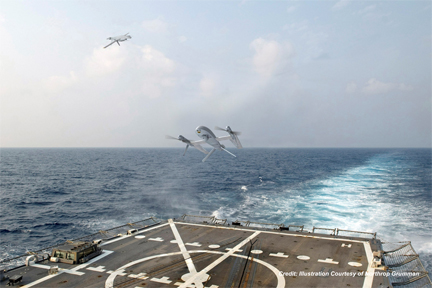Northrop Grumman has been awarded a contract by the Defense Advanced Research Project Agency’s Tactical Technology Office to design an autonomous vertical takeoff and landing uncrewed aircraft system capable of operating from a moving Navy ship at sea.
The AdvaNced airCraft Infrastructure-Less Launch And RecoverY (ANCILLARY) demonstrator will be designed as a cost-efficient, multiple-mission capable vehicle built on an agile platform that is runway independent.
Northrop Grumman’s ANCILLARY demonstrator will be capable of carrying a large 60-pound sensor payload with greater endurance of 20 hours’ time on station and mission radius range of 100 nautical miles, which is more than current systems, without using significant additional infrastructure aside from what is on board the air vehicle. The system will also have capability to land on a ship in adverse weather conditions.
The aircraft will be capable of performing intelligence, surveillance, reconnaissance and targeting missions, and supporting expeditionary missions for special operations forces and logistical missions with significant affordability impacts for ship-to-shore transition of parts and supplies.
“In collaboration with DARPA, Northrop Grumman will work to significantly enhance how future autonomous vertical lift aircraft will operate at sea and ashore,” said Tim Frei, vice president, research and advanced design at Nortrop Grumman. “The ANCILLARY program enables us to combine our digital engineering expertise with extensive knowledge and insights from past successes in developing and operating uncrewed vertical lift aircraft for the U.S. Navy.”
DARPA’s ANCILLARY program aims to develop and flight demonstrate an X-plane with the critical technologies required for a leap-ahead in long endurance, VTOL unmanned air system performance.
The UAS would be able to launch and recover from ship flight decks and small austere land locations in adverse weather without additional infrastructure equipment, thus enabling expeditionary deployments. Unlike large VTOL systems, the small UAS size would allow many aircraft to be stored and operated from one ship creating a tactical beyond-line-of-site, multi-intelligence sensor network capability.










